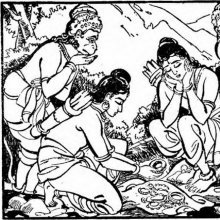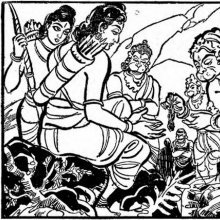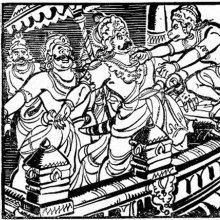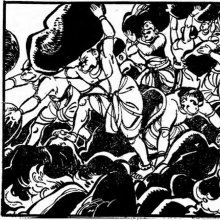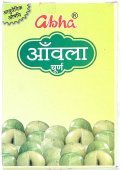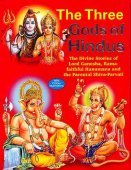Sight: 1 definition
Introduction:
Sight means something in Hinduism, Sanskrit. If you want to know the exact meaning, history, etymology or English translation of this term then check out the descriptions on this page. Add your comment or reference to a book if you want to contribute to this summary article.
Images (photo gallery)
(+3 more images available)
In Hinduism
Natyashastra (theatrics and dramaturgy)
Source: Shodhganga: Elements of Art and Architecture in the Trtiyakhanda of the Visnudharmottarapurana (natya)Sight or Glance is denoted by the Sanskrit term Dṛṣṭi which, in Indian Dramas, refers to the “proper accomplishment of glances”, according to the Viṣṇudharmottarapurāṇa, an ancient Sanskrit text which (being encyclopedic in nature) deals with a variety of cultural topics such as arts, architecture, music, grammar and astronomy.—Dṛṣṭi is very important in a dance form. The appropriate movements of eyes, eyeballs and eyebrows of an artist make the performance more charming. There are thirty six kinds of glances (dṛṣṭi) accepted in the Viṣṇudharmottarapurāṇa.

Natyashastra (नाट्यशास्त्र, nāṭyaśāstra) refers to both the ancient Indian tradition (shastra) of performing arts, (natya—theatrics, drama, dance, music), as well as the name of a Sanskrit work dealing with these subjects. It also teaches the rules for composing Dramatic plays (nataka), construction and performance of Theater, and Poetic works (kavya).
See also (Relevant definitions)
Query error!
Full-text (+1726): Drishti, Ikshana, Cakshurvishaya, Drishtiputa, Darshana, Avalokana, Shmashanavairagya, Driggocara, Aloka, Vilokana, Andha, Locana, Samdarshana, Prekṣaṇa, Darshanakankshin, Cakshusha, Netrakoranna, Najaracuka, Kudrishti, Vidhuradarshana.
Relevant text
Search found 488 books and stories containing Sight, The sight; (plurals include: Sights, The sights). You can also click to the full overview containing English textual excerpts. Below are direct links for the most relevant articles:
Yoga Vasistha [English], Volume 1-4 (by Vihari-Lala Mitra)
Chapter CXXXVII - Description of the states of waking, sleeping and dreaming < [Book VII - Nirvana prakarana part 2 (nirvana prakarana)]
Chapter CLXII - Annihilation of ignorance < [Book VII - Nirvana prakarana part 2 (nirvana prakarana)]
Chapter CXC - Ecstasis or inertness of rama < [Book VII - Nirvana prakarana part 2 (nirvana prakarana)]
Mahabharata (English) (by Kisari Mohan Ganguli)
Section 16 < [Stri-vilapa-parva]
Section CCXIV < [Mokshadharma Parva]
Section LV < [Anusasanika Parva]
Kautilya Arthashastra (by R. Shamasastry)
Chapter 2 - Enticement of Kings by Secret Contrivances < [Book 13 - Strategic Means to Capture a Fortress]
Chapter 6 - The March of Combined Powers < [Book 7 - The End of the Six-fold Policy]
Chapter 2 - Replenishment of the Treasury < [Book 5 - The Conduct of Courtiers]
Harshacharita (socio-cultural Study) (by Mrs. Nandita Sarmah)
11. Popular Beliefs, Omens and Superstitions < [Chapter 6 - Other Socio-Cultural Aspects]
8. Religion and Religious Tolerance < [Chapter 6 - Other Socio-Cultural Aspects]
Part 3: Description of Different Tribes and Sub-Castes < [Chapter 2 - Caste System]
Dramaturgy in the Venisamhara (by Debi Prasad Namasudra)
Bībhatsa Rasa (Disgust) < [Chapter 4 - Dramaturgy in Veṇīsaṃhāra]
Bībhatsa Rasa (disgust) < [Chapter 4 - Dramaturgy in Veṇīsaṃhāra]
Karuṇa Rasa (the pathetic sentiment) < [Chapter 4 - Dramaturgy in Veṇīsaṃhāra]
The Twin Poems of Milton < [April – June, 1981]
A Wanderer in the Middle East < [January-February, 1929]
An Arrival Auspicious < [April – June, 1999]
Related products
(+1 more products available)
